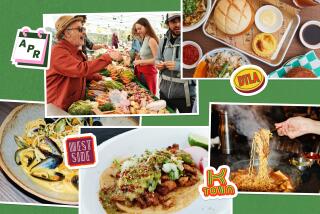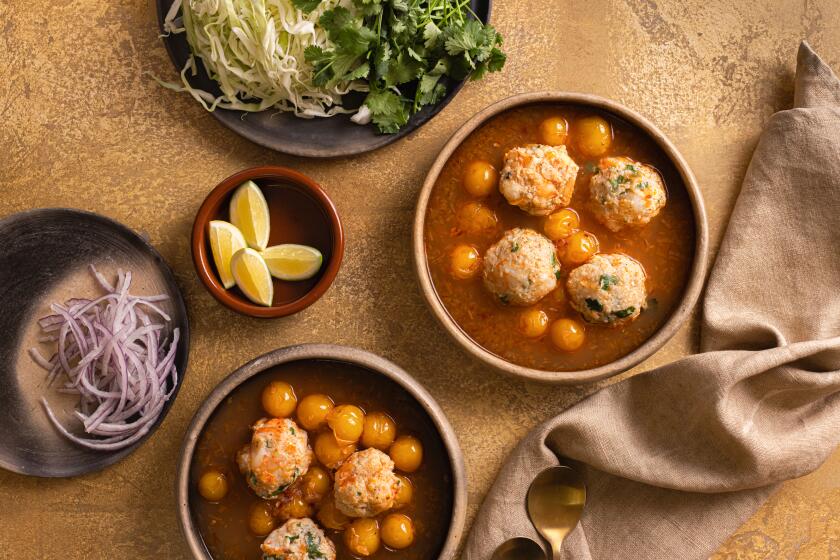Supreme Court Won’t Hear Wine Dispute
The U.S. Supreme Court sent a message Monday to Bronco Wine Co.: Chuck it -- for now.
The maker of the popular $1.99 Charles Shaw wine, widely known as “Two Buck Chuck,” hit another stumbling block in its fight to use the word “Napa” on wines that contain few, if any, Napa-grown grapes. The nation’s high court rejected without comment Bronco’s request for it to intercede in a dispute over how California wines are labeled.
Under state law, winemakers are forbidden to use a regional name such as “Napa” on their labels unless 75% of the grapes in the bottle were actually grown in the same locale.
Bronco, based in Ceres in the Central Valley, has argued that the 2000 law was written with only one company in mind -- Bronco -- and that federal rules allow it to use place-name designations even when most grapes were harvested elsewhere.
“This particular case involves a statute that is narrow and doesn’t affect any winery but Bronco,” said Peter M. Brody, the company’s Washington attorney.
Under the California statute, Bronco would have to change the name of three of its brands: Napa Ridge, Napa Creek Winery and Rutherford Vintners. Bronco contends that because it purchased those brands before the enactment of a 1986 federal law that set grape levels but grandfathered in existing wine labels, the federal law should trump California’s label law.
The California Supreme Court declined to overturn the state’s label law last summer. Bronco and owner Fred Franzia will press their case on other constitutional grounds, including commercial free speech rights, Brody said.
A new set of arguments is scheduled for April 20 in state appellate court, and the case may wind up before the U.S. Supreme Court again. The state law won’t be enforced until those challenges are concluded.
Still, Bronco’s Supreme Court rebuff was embraced by Napa Valley winemakers, whose 250-member trade group lobbied in favor of the law and led the defense in court.
“We’re very gratified,” said Tom Shelton, president of the Napa Valley Vintners Assn. and head of Joseph Phelps Vineyards. He called the decision “a big step” for truth in advertising but stopped short of claiming victory. “What we need is for the [state] law to be enforced.”
Not wanting to leave the issue completely in the courts’ hands, the Napa Valley vintners have launched a new marketing campaign that encourages Napa wineries to label their brands as 100% Napa wine, so consumers will know that it has been grown, produced and bottled in the venerated region, Shelton said.
Bronco attorney Brody said the issue goes beyond deciding what’s behind a name. The bigger concern to him is the use of state legislation to circumvent federal regulations.
“We think that is a prospect that ought to cause concern among many people in the industry who have to deal with an already complicated regulatory environment,” Brody said.
Dozens of wine executives have publicly supported Bronco’s position. One of them is California winemaker Don Sebastiani, who sells a moderately priced Napa-grown wine called Screw Kappa Napa that competes with Bronco’s Napa-labeled wines.
Sebastiani said Bronco had “redressable grievances” in part because Bronco’s brands were less promotions for the Napa Valley than catchy slogans.
“Hawaiian Punch doesn’t come from Hawaii. Philadelphia Cream Cheese doesn’t come from Philadelphia,” he said.
Bronco owner Franzia has long vexed the state’s wine industry for his aggressive marketing techniques and has had previous legal run-ins over labeling issues. He has been criticized for his unabashed efforts to capitalize on Napa Valley’s cachet while using cheaper grapes from other locations.
At the same time, he has been credited with helping the state pull out of a slump by sparking new interest in less-expensive wines. His Charles Shaw brand, sold only at the Trader Joe’s grocery chain, is one of the most popular of all California wines, logging more than $100 million in annual sales.
Franzia’s Napa- and Rutherford-labeled wines take in about $17 million in sales annually. So even if he loses all legal appeals in the name case, “it’s not the end of the world,” said wine market researcher Jon Fredrickson. “They’ll survive fine,” he said.
Besides, many wine drinkers probably aren’t paying too much attention to the place name on a bottle. “It’s way overestimated what consumers think and know about wine,” Fredrickson said. “Consumers look for something that tastes good, goes well with food, is priced right and has an attractive label.”
More to Read
Eat your way across L.A.
Get our weekly Tasting Notes newsletter for reviews, news and more.
You may occasionally receive promotional content from the Los Angeles Times.






